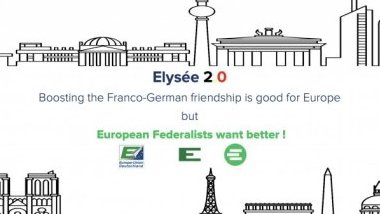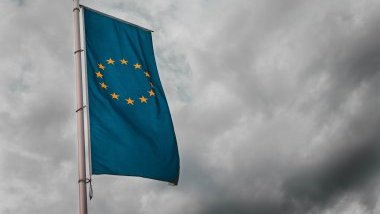Dear Mr Macron, dear Mrs Merkel,
The Treaty of Aachen reaffirms Franco-German friendship, codifies established processes and, to satisfy Germany’s aspiration to gain a permanent seat on the UN Security Council, it also sacrifices the idea of an EU seat on that body.
When the Élysée Treaty was signed 56 years ago, this was not a foregone conclusion. The long enmity between the two neighbouring countries had sometimes been called hereditary enmity and was considered insurmountable. That De Gaulle and Adenauer signed a treaty to make enemies friends after steps of rapprochement – such as the Schuman Plan (1950) or the Saar Treaty (1956) – and half a year after their "Reconciliation Mass” in Reims (1963), was not a given. It could only be achieved through the committed work of statesmen. The further development of Franco-German friendship is a success story.
With the new Treaty of Aachen, first signed in the Coronation Room of Aachen’s town hall and then ratified by the French National Assembly and the German Bundestag, cooperation in border regions is to be intensified, school-leaving qualifications mutually recognised and intergovernmental cooperation enhanced. Regarding the latter, there will continue to be an annual meeting of the government cabinets and every three months a member of one government will attend a cabinet meeting of the other.
In addition to practical changes, there is of course a lot of political symbolism. At a time when many states are focusing on unilateral relations, this aspect is important, especially for strong representatives of multilateralism like you. Whether it is a practical goal or a symbolic-political initiative, your common aim to establish a permanent seat on the UN Security Council for the Federal Republic of Germany is completely wrong. Not only does this reject the repeatedly expressed goal of transforming France’s permanent seat on the UN Security Council into an EU seat – Vice-Chancellor Scholz’s proposal was declined by Paris in November – it also rejects the very idea of “one voice from Europe”.
While your two governments are saying that the Continent can only benefit from another permanent seat for a European state, it is also important to be honest with oneself: Only a common EU seat in the sense of an enhanced Common Foreign and Security Policy (CFSP) can ensure reliable and legally sound representation of the European Union on the global stage.
Acknowledgeable is at least the French approach to include Brazil, India, Japan and two African states as well as the Federal Republic of Germany in order to make the body more diverse – however, due to the veto system this is virtually hopeless. Russia, China, the USA or even Great Britain have no interest in enlargement. The Security Council would just become even more paralysed. Actually, the right of veto should be abolished!
In the long term, the establishment of a ‘world parliament’ is certainly an ambitious goal, but until then many small steps will be needed to democratise the United Nations. A permanent seat for Germany instead of a strong EU voice is not one of those steps!
Apart from this, the goals in the Treaty of Aachen are to be commended. The Joint Defence Council is a necessity in order to respond better to international crises. The European community is not yet ready to respond jointly, although tools such as the Permanent Structured Cooperation (PESCO) are the first tentative steps towards a common defence policy, even if not all Member States participate. And last but not least, with common rescue systems, rescuers will be able to bring injured people to the nearest hospital, irrespective of borders. Citizens will see the practical benefit and this will hopefully encourage cooperation with other neighbouring states.
Es lebe die deutsch-französische Freundschaft! Vive l’amitié franco-allemande!
Federalist regards,
Tim Odendahl





Follow the comments: |
|
